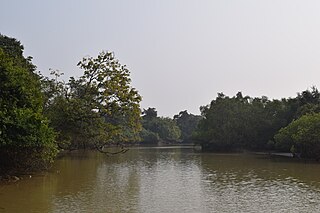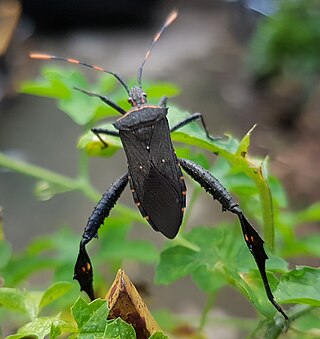
Convolvulaceae, commonly called the bindweeds or morning glories, is a family of about 60 genera and more than 1,650 species. These species are primarily herbaceous vines, but also include trees, shrubs and herbs. The tubers of several species are edible, the best known of which is the sweet potato.

Tilapia is the common name for nearly a hundred species of cichlid fish from the coelotilapine, coptodonine, heterotilapine, oreochromine, pelmatolapiine, and tilapiine tribes, with the economically most important species placed in the Coptodonini and Oreochromini. Tilapia are mainly freshwater fish inhabiting shallow streams, ponds, rivers, and lakes, and less commonly found living in brackish water. Historically, they have been of major importance in artisanal fishing in Africa, and they are of increasing importance in aquaculture and aquaponics. Tilapia can become a problematic invasive species in new warm-water habitats such as Australia, whether deliberately or accidentally introduced, but generally not in temperate climates due to their inability to survive in cold water.

Bhitarkanika Mangroves is a mangrove wetland in Odisha, India, covering an area of 650 km (400 mi) in the Brahmani River and Baitarani River deltas.

The Encyclopedia of Life (EOL) is a free, online encyclopedia intended to document all of the 1.9 million living species known to science. It aggregates content to form "page"s for every known species. Content is compiled from existing trusted databases which are curated by experts and it calls on the assistance of non-experts throughout the world. It includes video, sound, images, graphics, information on characteristics, as well as text. In addition, the Encyclopedia incorporates species-related content from the Biodiversity Heritage Library, which digitizes millions of pages of printed literature from the world's major natural history libraries. The BHL digital content is indexed with the names of organisms using taxonomic indexing software developed by the Global Names project. The EOL project was initially backed by a US$50 million funding commitment, led by the MacArthur Foundation and the Sloan Foundation, who provided US$20 million and US$5 million, respectively. The additional US$25 million came from five cornerstone institutions—the Field Museum, Harvard University, the Marine Biological Laboratory, the Missouri Botanical Garden, and the Smithsonian Institution. The project was initially led by Jim Edwards and the development team by David Patterson. Today, participating institutions and individual donors continue to support EOL through financial contributions.
The Reptile Database is a scientific database that collects taxonomic information on all living reptile species. The database focuses on species and has entries for all currently recognized ~13,000 species and their subspecies, although there is usually a lag time of up to a few months before newly described species become available online. The database collects scientific and common names, synonyms, literature references, distribution information, type information, etymology, and other taxonomically relevant information.

iNaturalist is an American 501(c)(3) nonprofit social network of naturalists, citizen scientists, and biologists built on the concept of mapping and sharing observations of biodiversity across the globe. iNaturalist may be accessed via its website or from its mobile applications. iNaturalist includes an automated species identification tool, and users further assist each other in identifying organisms from photographs. As of 24 February 2024, iNaturalist users had contributed approximately 172,751,520 observations of plants, animals, fungi, and other organisms worldwide, and around 350,000 users were active in the previous 30 days.

Silinae is a subfamily of soldier beetles in the family Cantharidae. There are about 6 genera and more than 180 described species in Silinae.

Xylechinus is a genus of crenulate bark beetles in the family Curculionidae whose 53 described species include:

Discodon is a genus of soldier beetles in the family Cantharidae. There are more than 40 described species in Discodon.
Discodon bipunctatum is a species of soldier beetle in the family Cantharidae. It is found in North America.
Ectecephala laticornis is a species of grass fly in the family Chloropidae.
Opilioacarus texanus is a species of mite in the family Opilioacaridae.
Aradus implanus is a species of flat bug in the family Aradidae. It is found in North America.
Nausigaster texana is a species of syrphid fly in the family Syrphidae.

Leptoglossus gonagra, known as the passionvine bug, citron bug or squash bug in different parts of its range, is a species of leaf-footed bug in the family Coreidae. It is found in Africa, the Caribbean, Central America, North America, South America, Southern Asia, the Pacific Ocean and Oceania.
The Himalayan long-eared bat, also known as Hodgson's long-eared bat, is a species of bat in the family Vespertilionidae. It is ranges from the Indian subcontinent east to China and south to Vietnam.

Baccharis articulata is a species of shrub in the family Asteraceae.
Discodon flavomarginatum is a species of beetle native to Arizona in the United States. Its color varies throughout the body, which is 14 millimetres (0.55 in) long. It has a rounded thorax and roughly textured elytra.










